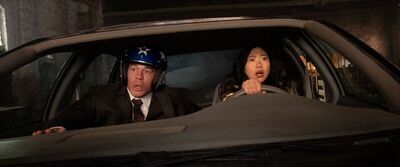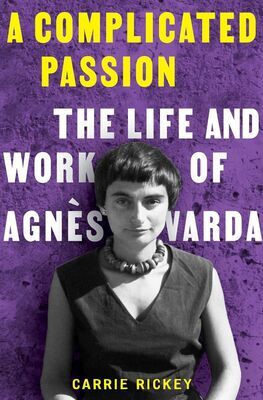

“Jackpot!” is a trashy and repetitive action comedy about greed and bloodlust set in a world full of people who are proud to be awful. Directed by Paul Feig (“Spy”), it’s set in near-future Los Angeles, which begins to seem like a statement in itself as the movie goes along. There’s a statewide lottery. For some reason, the state government has decreed that citizens are permitted to hunt and kill winners to try and take their prize money. A handful of rules govern the hunt. One is, only those who’ve purchased a ticket and lost the draw can take part. Another rule is: no guns allowed. A third is: the hunt can only go on for 24 hours. If the original winner has survived at the end of that period, they get to keep their winnings.
Other than that, anything goes. Participants can use knives, clubs, broken bottles, bats, chains, rubber hoses, spears, curtain rods, mop handles, and presumably automobiles (though I don’t recall anyone trying to run anyone down deliberately, which seems like a strange omission in retrospect). They can hunt alone or in groups, even very large groups.
Awkwafina plays the target of the latest hunt, Katie Kim, a former actress who just returned home from many years spent visiting her dying mother in another state. Her dad died a while before. She didn’t have a good relationship with either parent. We get a bit of detail about her personal life to explain why she doesn’t know anything about the California state lottery turning into a murderous manhunt (she’s been spending time with her mom; no, really, that’s the reason) and also why she’s worthy of our sympathy (beyond the fact that, like other past lottery winners, she doesn’t deserve to be hunted like an animal; nobody does). Katie comes into her own winning ticket purely by accident and doesn’t realize she has it until her number comes up during an audition (which she doesn’t get) and everybody starts looking at her like a cartoon wolf staring at a sheep and imagining lamb chops.
An entire economy seems to have grown up around the lottery hunt, though the movie only zeros in on one part: the security experts who locate winners and offer them protection from harm in exchange for a cut of their fortune. John Cena plays one such security guard, a lovable bruiser named Noel. He used to work for a very successful lottery security company run by a snotty badass named Louie Lewis (Simu Liu). He saves Katie from death after the audition, when everyone in the building, including other actresses and a gymnasium full of karate students, have turned on her. She studied stage fighting but didn’t learn a lot. Her instincts are good, but she lacks the moves to survive. Without Noel, she’d be dead meat. And without Katie, Noel would be just another square-jawed he-man. (He’s got a backstory, of course, which Katie will gradually pry out of him.)
Written by Rob Yescombe, whose prior work was mainly on video games, “Jackpot!” doesn’t make a lick of real-world sense, and it’s not supposed to. It has a video game-like repetitiousness and gradual escalation, leading to a Big Boss showdown. There’s a lot of obviously improvised comedy that sometimes lands but more often feels like somebody filmed the exercises in a comedy performance workshop. It’s all in service of a movie that’s more half-baked goof than full-blown satire.
And it seems committed to not investigating the deeper implications of the scenario it’s presenting, in which the lottery hunt is the logical outgrowth of a society that seems to have completely given up on modeling decent values and has decided instead to monetize the worst human behavior. When Katie rents a tiny room from a website and realizes when she gets there that it doesn’t look anything like the pictures online, the young woman who rents it, appropriately named Shadi (Ayden Mayeri), chirps “we used fake photos, because who’s gonna stay here if we don’t?” Early in the movie, Katie sees a hateful stage dad loudly and profanely griping about his young daughter, who just failed an audition. “Sorry for all the bad words,” he tells the kid. “I only curse when your mom’s being a f—–g b—h.”
Ace character actress Becky Ann Baker gives us a glimpse of what the movie could’ve become in her brief performance as a lady who seems gentle and kind but is anything but. She captures the professional predator’s self-satisfied inward smirk at fooling somebody who trusts them, a marrow-deep rottenness that is expressed through fleeting glimmers in the eyes, and that is visible only to people who know what to look for.
But with a few exceptions, the movie’s way shallower than its best character moments. We don’t know what the state gets out of letting people hunt lottery winners–as in the “Purge” series, it seems on its face as if the cleanup required the next day would outweigh whatever value the exercise has in collectively permitting a society to let off some steam–but this is frankly not the kind of movie where you are supposed to think anything except, “that was a pretty funny line,” or “that looks like that must’ve hurt” or “cool stunt.”
There are seeds here that could’ve flowered into an audacious action comedy, perhaps in the vein of “Robocop” or “The Running Man” or “Battle Royale.” I kept thinking of that last one throughout “Jackpot!” because, unlike “Jackpot!,” it’s so cynical that it has moved beyond bitterness and into a kind of blase matter-of-factness, and also because it has an actual vision rather than a notion, and the action is imaginatively framed, lit, choreographed, and edited, an area of filmmaking that has never been Feig’s strength or, honestly, one of his main areas of interest (though “Spy” had its kickass moments, such as the kitchen fight).
The two stars have good chemistry – they seem to genuinely enjoy being around each other – but there’s nothing in the script that challenges either of them in the way that James Gunn challenged Cena in two genuinely special superhero projects, “The Suicide Squad” and “Peacemaker,” or that Lulu Wang challenged Awkwafina in “The Farewell.” For the most part, this is a lackadaisical project that is an example of the coarsened sensibilities it’s making fun of. As is often the case with improv-driven movies, the outtakes that play during the end credits are more natural and pleasurable than the movie.


